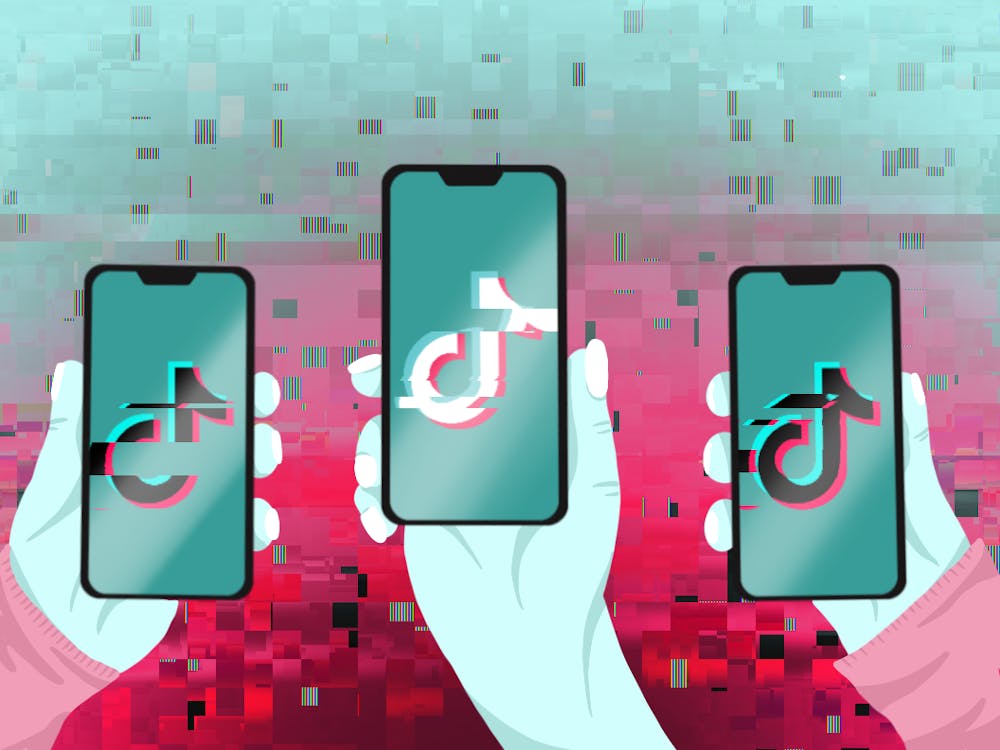Under TikTok’s UF hashtag, there are more than one billion videos featuring students’ day-in-the-life vlogs, Gators sports videos, club promotions and other videos about college life. Even UF’s official TikTok account has accumulated more than one million likes.
Despite the school’s growing presence on the app, the use of TikTok could be prohibited at UF starting in March after a proposal from Gov. Ron DeSantis. The bill will be heard in the March 2023 legislative session.
DeSantis’ “Digital Bill of Rights” would ban social media platforms with ties to China — like TikTok — through internet services on colleges, universities and public schools. TikTok is owned by Chinese company Bytedance.
“Our Digital Bill of Rights will ensure Floridians are protected from the overreach and surveillance we have seen from Big Tech companies,” DeSantis said in a press release.
Becca Vosilla, a 19-year-old UF chemical engineering freshman, said she understands concerns surrounding TikTok’s use of data, but those concerns can be applied to any other social media app or international company.
U.S. Sen. Marco Rubio and U.S. Rep. Mike Gallagher called for a national TikTok ban in November 2022.
The Digital Bill of Rights would go beyond that. It not only calls for a ban of TikTok, but any other social media platforms with ties to China, which could include apps like WeChat and QQ.
“I do think that it is a little bit of an overreaction, just because it's China,” Vosilla said. “Nobody's having these concerns about American-owned companies.”
If implemented, the bill would block TikTok and other services through UF’s Wi-Fi. It would also require search engines like Google to disclose whether they prioritize search results based on political ideology or monetary consideration. As described in a flier from the governor’s office, the aim of the policy is to protect personal data, discourage online censorship and protect children from online harm.
Social media as a whole can be problematic based on its addictive nature, Vosilla said, but banning a platform for college students based on government relationships may need to be reevaluated.
“I do think that is something that we should look at more critically because that is kind of encroaching into a speech issue,” she said. “That does to me seem a little bit like a power grab.”
Jayda Killinger, a 19-year-old UF music and language sophomore, said she was initially relieved to hear about TikTok’s potential ban because she stayed clear of the app after realizing how addictive it can be.
But the privacy concerns that began this conversation are nothing new in the social media sphere, she said.
Another social media platform similar to TikTok would likely surface if the app were inaccessible through UF Wi-Fi, Killinger said. Students and creators will continue to find ways to broadcast their voices, ideas and art.
“What data is not being extracted from us already?” Killinger said. “I wasn't panicking. I wasn't like, ‘Oh my gosh, the Chinese government has my data.’”
The bill comes after months of controversy with privacy concerns over TikTok. In November 2022, FBI director Christopher Wray told members of the House Homeland Security Committee there were concerns regarding data collection by the Chinese government.
Bella Scramoncin, a 19-year-old UF entomology sophomore, said banning TikTok on government devices or work phones has merit based on a company’s privacy decisions, but students should be able to decide for themselves if they will take the risk of having their online data used.
“A lot of people that have TikTok are aware that it's a China-created app,” Scramoncin said. “So I think that we should have the right to make that decision for ourselves on our personal devices.”
Chinese security laws allow for compulsory data sharing with the government. TikTok has acknowledged non-U.S. employees’ access to U.S. users’ data and said the company is working to safeguard user data and U.S. national security interests.
McKayla Keels, an 18-year-old UF natural resource conservation sophomore, said TikTok has an algorithm that is both intentional and malicious, and its data collection is concerning.
“I don't know why they need access to your whole camera roll,” Keels said. “That to me is suspect.”
Although Keels doesn’t have TikTok downloaded and said the app is a distraction from real life, she doesn’t think it’s worth banning from university networks. Part of the issue is that the U.S. has developed a “mistrust of people from China,” which Keels said has only exacerbated American skepticism of the app.
“I think [DeSantis is] worried about the wrong stuff,” Keels said.
Ryan Maziarka, a 19-year-old UF business freshman, said he uses social media 2 to 3 hours a day, and it composes the majority of his screen time.
While the ban would still allow for use of social media platforms through external cellular data, Maziarka worries about the implications of the policy.
“What else are they going to control if they just start with social media?” he said.
Daniella Alfonso, a 19-year old UF public relations sophomore who manages social media for UF HerCampus and UF Tower Yearbook, believes students who study communications would suffer if TikTok weren’t allowed on university networks.
“If we are discouraged from using TikTok,” she said, “how would that affect us from succeeding when we are in our careers and we have to evaluate these TikTok platforms?”
Ella Thompson contributed to this report.
Contact Peyton and Sophia at pharris@alligator.org and sbailly@alligator.org. Follow them on Twitter @peytonlharris and @sophia_bailly.
Sophia Bailly is the Fall 2024 University Editor. She interned for The Times-Picayune in Louisiana this past summer as a Capitol News Bureau reporter. When she's not reading the news, she can be found listening to podcasts, going for a run or studying Russian.

Peyton Harris is a third-year English major and Senior News Director for the Alligator. In her free time, she likes to doomscroll on Twitter and crochet.






